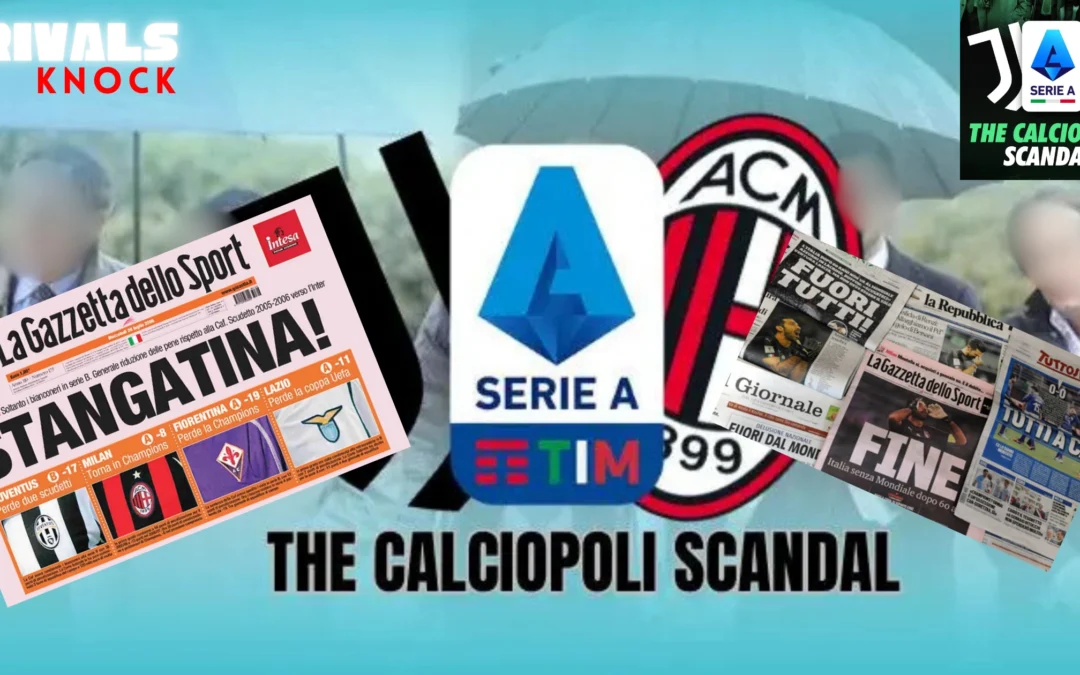The Glory Days: When Italy Ruled the Football World
In the 1980s and 1990s, Italian football was the heartbeat of the sport. Clubs like AC Milan, Inter Milan, and Juventus weren’t just giants in Italy—they were the kings of world football. Serie A was the most-watched league globally, with the highest average attendance in Europe—stadiums packed with passionate fans chanting for their heroes. From 1982 to 1998, 13 of 17 Ballon d’Or winners played in Italy, legends like Marco van Basten and Roberto Baggio lighting up the pitch. Between 1983 and 1998, 12 of 36 European finalists were Italian clubs, a testament to their dominance. Every World Cup winner, every Ballon d’Or hopeful, either played in Italy or dreamed of doing so. It was a magical land where tactics evolved—think Arrigo Sacchi’s pressing at Milan—and players like Diego Maradona became gods, turning Napoli from relegation battlers to champions. But beneath this golden age, a dark undercurrent was brewing, one that would break the trust of fans forever.
A Red Card That Changed Everything: The Messina-Venezia Spark
In 2004, a seemingly ordinary Italian second-division match between Messina and Venezia became the spark that ignited a firestorm. Referee Luca Palanca, a man with a clean reputation in Italy’s corrupt football world, handed out three red cards—all to Venezia players. On the surface, it looked routine, but this match was a must-win for Messina to secure promotion to Serie A. They won, but whispers grew loud: had the game been rigged? Several second-division club owners accused Messina of fixing their entire campaign with referee help. Investigators, already sniffing out connections between football and crime, seized their chance. They uncovered the “Roman Gang”—referees Palanca, Marco Gabriele, and Massimo De Santis—who officiated every Messina match that season, all of which Messina won. The smoking gun? All three referees and Messina’s board were linked to GEA World, a powerful agency owned by Luciano Moggi’s son, representing 25% of Serie A players. This red card wasn’t just a call—it was the beginning of Calciopoli.
The Puppet Master: Luciano Moggi’s Web of Power
Luciano Moggi wasn’t a player or coach—he was a master manipulator who learned the “dark arts” of football from Italo Allodi, the architect of Inter Milan’s 1960s success. Moggi’s power came from three pillars: referees, media, and GEA World. He controlled referees through favors, not cash—promising them big matches or jobs for their families in exchange for decisions favoring his teams, like overlooking Juventus tackles or suspending key opponents before big games. The media was his shield; bad calls in Juventus matches were never replayed on TV, leaving 40,000 stadium fans unable to prove what they saw. GEA World gave Moggi influence over other clubs—teams with 8 or 9 GEA-represented players had to stay on his good side to keep them. Moggi’s career took him from Lazio to Torino, Napoli to Roma, but at Juventus from 1994, his power peaked. After 8 years without a title, Juventus thrived under him—but at a cost. Moggi’s system wasn’t just corrupt; it was corruption itself.
Maradona’s Fall: The First Domino in Moggi’s Game
Moggi’s influence stretched back to his Napoli days, where he managed Diego Maradona, the god of Naples who led the club to two Serie A titles. But Maradona’s cocaine addiction and partying—habits he brought from Barcelona—threatened his career. Moggi protected him, using his federation connections to tip off Maradona about drug tests, even allegedly providing a prosthetic penis for clean urine samples. But in 1991, Maradona crossed a line. During a European Cup quarter-final against Spartak Moscow, he was too intoxicated to travel with the team, arriving a day late on a private jet. Napoli lost on penalties, a financial blow Moggi couldn’t forgive. Within five months, Maradona faced illegitimacy charges, media leaks of his addiction, links to the Camorra crime syndicate, and a surprise drug test Moggi didn’t save him from. A 15-match ban followed, forcing Maradona out of Italy. Moggi’s message was clear: even gods weren’t above his power. This was just a glimpse of what he was capable of.
The Unraveling: Wiretaps and a Nation’s Outrage
The Messina-Venezia red card led investigators to Telecom Italia wiretaps—over 200,000 recordings exposing Italian football’s rotten core. A call between Salvatore Amareasso and a betting company owner revealed Messina’s win was pre-arranged by “the black man,” one of many code words like “the handsome one” and “the great boss.” The tapes implicated everyone: referees, players, club owners, and federation heads like Franco Carraro, who had previously dodged punishment for giving non-EU players European passports (except for Inter Milan). Moggi wasn’t alone—AC Milan’s Adriano Galliani used similar tactics, while federation vice president Innocenzo Mazzini facilitated their schemes. Gazzetta dello Sport broke the story, and soon every newspaper followed, sparking public outrage. Fans who believed they were watching a beautiful game realized it was a rigged chess match. The accused resigned, but the damage was done. Calciopoli wasn’t just a scandal—it was a betrayal of trust that Italian football couldn’t escape.
Power in the Shadows: The Untouched Beneficiaries
Punishments came swiftly but unevenly. Juventus, Fiorentina, and Lazio were relegated, though Lazio and Fiorentina’s penalties were later relaxed. Juventus lost two titles—one awarded to Inter Milan—while AC Milan faced an 8-point deduction and a closed-door match. But the investigation, based on just six months of evidence, left gaps. Inter Milan emerged unscathed, even benefiting with a title, and enjoyed their most successful era under José Mourinho, culminating in the 2010 treble. Yet, the investigation’s head, Guido Rossi—a former Inter board member and Telecom Italia president—raised questions. Telecom Italia’s current president, Marco Tronchetti Provera, was Inter’s second-largest stakeholder, and Gazzetta dello Sport’s owner, Carlo Buora, was an Inter vice president. Inter president Massimo Moratti sat on both boards. Inter also escaped earlier passport fraud penalties. As the transcript notes, “power stays in the shadows.” Was Inter truly innocent, or did they master the game off the pitch? The truth remains murky.
A Broken Trust: Italian Football’s Lasting Scars
Calciopoli shattered Italian football’s golden age. Serie A, once the world’s pinnacle, fell behind the Premier League and La Liga, struggling financially as fans stopped attending games, their trust broken. The scandal revealed a system where success wasn’t earned on the pitch but orchestrated in the shadows—through referees, media, and player agencies like GEA World. Rivals Knock reflects on a sport that lost its soul: fans who once lived for the game now questioned every call, every result. Italian football hasn’t recovered—Serie A’s global viewership lags, and financial woes persist. What’s your take? Did Calciopoli kill the beauty of Italian football, or can it rise again? Share your thoughts on X with #CalciopoliLegacy and let’s dive into this dark chapter. Football is a game of trust—but once broken, can it ever be rebuilt?

